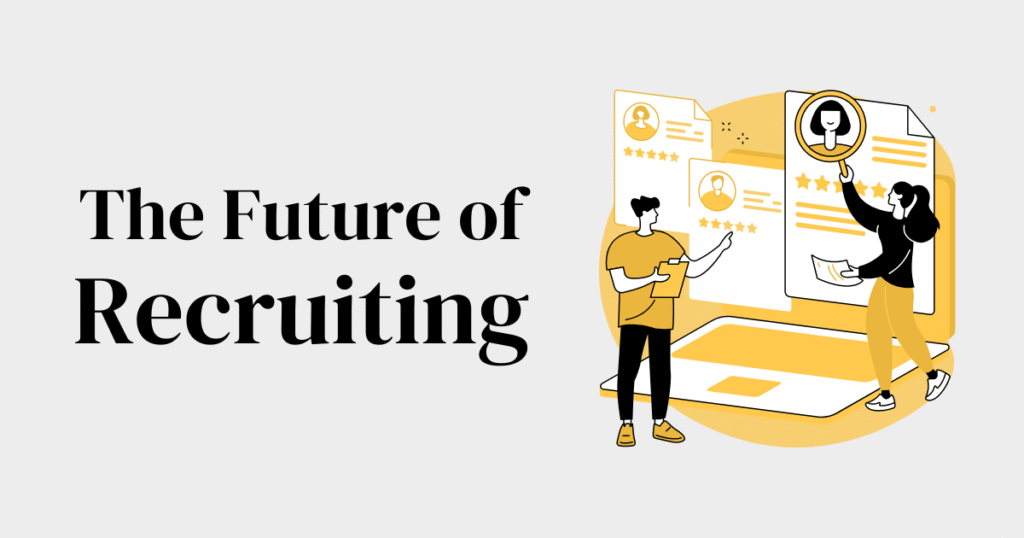The Future of Recruiting: 6 New Predictions and Trends
Being a recruiter or a recruiting leader in 2023 is not always easy or straightforward. To succeed despite facing many challenges, such as an uncertain economy, a shifting job market, evolving technology, skills gaps, and labor shortages, recruiters will need to get comfortable with change. By remaining adaptable and strategic, recruiters can stay competitive in tough markets and contribute to shaping the recruitment landscape in 2023 and beyond.
LinkedIn’s Future of Recruiting 2023 report offers insightful predictions based on “surveys of thousands of recruiting pros, and analysis of billions of data points generated on LinkedIn.” Let’s dive into some of the trends!
Recruiters will focus on employer branding
According to LinkedIn’s report, 60% of in-house recruiters predict their employer branding investments will increase in 2023.
A strong employer brand can help attract top candidates who are seeking out companies that align with their values and provide an ideal work culture. Focusing on the employer’s brand can help a recruiter build trust and credibility with candidates. This is especially important for highly competitive industries and regions where the best candidates have many options.
DEI initiatives will continue to be a priority
74% of recruiters who participated in LinkedIn’s survey say the uncertain economy is not lowering their priority of DEI hiring, and nearly 20% say it’s a higher priority now.
There are so many benefits of a diverse workforce such as better decision making, better understanding and ability to relate to a diverse customer base, and increased innovation. LinkedIn found that DEI in a workplace is also important to the next generation of employees, with Gen Z being 17% more likely to prioritize an inclusive workplace for diverse backgrounds than Gen X.
Skills-based hiring will become the norm
According to the report, 75% of recruiters predict skills-first hiring will be a priority for their company in the next 18 months.
Recruiters and employers alike are realizing the value of seeking out candidates based on their applicable skills for a role, rather than previous job titles or degrees from prestigious universities. Previous job titles can sometimes be misleading or not accurately reflect the full extent of a candidate’s skills and experience. Skills-based hiring may be a better way for recruiters to accurately assess a candidate’s suitability for a particular role and to identify potential areas for growth and development. Another positive aspect of skills-based hiring is that employers who will consider hiring candidates who don’t have a college degree, but do have the necessary skills and experience for a role, are taking a step towards diversifying their workforce.
Business leaders will find value in internal recruiting
75% of recruiters who were surveyed said internal recruiting will be an important factor that will shape recruiting over the next five years.
With an uncertain economy and many business leaders seeking to retain top talent and potentially reduce external recruiting budgets, internal recruiting will become a more common practice. Internal mobility in a company offers a lot of benefits such as increased retention of talent, better employee engagement and morale, and the potential for knowledge transfer within a company. Promoting from within can also demonstrate that a company values its employees and is willing to invest in their development.
Employers will hire more contract workers
LinkedIn data shows that the share of US job posts for contractor roles increased 26% year/year, while full time roles only grew by 6% year/year.
As volatility and uncertainty grows in economies and job markets worldwide, employers may rely heavier on contingent workers. Hiring contract workers allows employers to increase flexibility and potentially reduce admin burden and costs. As a recruitment company, there are many benefits to hiring contractors in profitable markets, such as the US, where the gig economy is booming.
AI will help recruiters save time
According to the report, here are the top recruiting outcomes hiring pros hope to see from AI:
- 74% of recruiters surveyed hope AI can automate repetitive tasks to prioritize more strategic work
- 67% of recruiters surveyed hope AI can make it faster and easier to source candidates
- 59% of recruiters surveyed hope AI can make it faster and easier to engage candidates
AI in recruiting can offer many benefits to recruiters, such as increased efficiency, enhanced data, and cost savings. There is also the chance that AI can reinforce biases in recruiting and pose legal risks having to do with the lack of transparency. Counsel in NYC has already passed a AI bias law with the intention of protecting candidates and employees during the hiring and promotion processes.
Disclaimer: This post is provided for informational purposes and should not be considered legal advice, the final word on this topic or a political opinion



